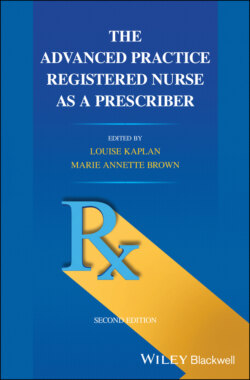Читать книгу The Advanced Practice Registered Nurse as a Prescriber - Группа авторов - Страница 7
Оглавление
Preface
The purpose of this book is to provide advanced practice registered nurses (APRNs) with the information necessary to be fully informed, rational, and ethical prescribers. The genesis of this book was our teaching, practice, and research. Throughout our professional lives as nurse practitioners, we have experienced the demands, difficulties, and satisfaction inherent in accomplishing this goal.
In 2001, Washington State APRNs obtained prescriptive authority for Scheduled II–IV controlled substances. Our research revealed that when controlled substance prescribing was initially optional, many APRNs did not apply for this hard‐won prescriptive authority. Some were reluctant to prescribe controlled substances. The slower‐than‐expected transition prompted our desire to develop a more in‐depth understanding of how APRNs adopt the role of a prescriber. Likewise, our colleagues, the chapter authors, were inspired to share their prescribing wisdom gleaned from experience to mentor students and colleagues. They dedicated countless hours to the time‐consuming and often difficult challenge of writing in addition to their ongoing professional demands.
We intend for this book to assist students who are adopting the role of APRN prescriber. We also intend to assist practicing APRNs who confront challenges as they transition to the full scope of the prescriber role. Most APRNs need to deepen their knowledge base as they fully implement new or expanded roles, particularly that of fully autonomous prescriber. Ultimately, this information will assist our colleagues across the nation and the world as they work to advance the profession to better serve patients. As APRNs enhance their prescribing expertise, they will enrich their professional opportunities to contribute to greater access and more patient‐centered care. This expertise is also a basis on which we can create changes necessary to improve the quality of healthcare delivered to Americans.
Over the decades, multiple studies and national statements have supported the need for APRNs to practice to the full extent of their education and expertise. The major recommendation is that legal and regulatory barriers to APRN practice should be eliminated. We thank the APRNs who have worked tirelessly to do just that.
We acknowledge policymakers as well as local, state, and national nursing organizations that have been instrumental in advancing the profession of nursing. They honored the dream of advanced practice nursing pioneers who championed their creative innovation that is part of our professional heritage. We dedicate this book to the APRNs who continue the work needed to eliminate the barriers to full practice authority for all APRNs. We will not rest until we meet that goal!
Louise Kaplan and Marie Annette Brown
